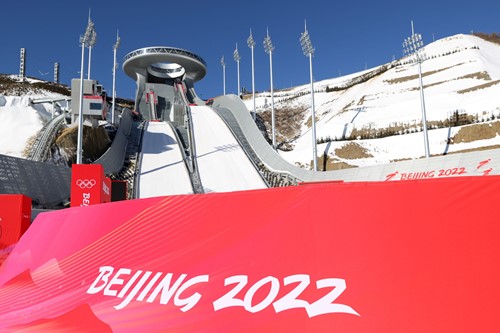
2022: Sport and Human Rights to the Fore
Last week the Centre published its Annual Activity Report, reviewing 2021 and looking ahead to 2022. Check out Mary Harvey's introduction to the report, and our opening message for the New Year here:
Everyone working to promote human rights in sport knows that our collective efforts are gaining in prominence, with growing awareness of why this agenda matters and where progress is being made. At the same time, we face the painful realities of ongoing harms linked to sport that must be urgently addressed so that rights abuses are prevented in the future.
Like all of society, 2021 saw the world of sport continue to confront challenges posed by the Covid-19 pandemic. Despite this global health crisis, many in the sport ecosystem took notable steps to advance the human rights agenda. Prominent athletes continued to use their platforms to speak out on critical issues such as mental health, social justice and LGBTQI+ rights, even as many others, notably women and child athletes, continued to face serious threats and abuse. Sports bodies took noteworthy steps as well, with the most gender-balanced Olympic Games in history, the IOC publishing a Framework on Fairness, Inclusion and Non-Discrimination, FIFA launching a global consultation on safe sport, and World Athletics unveiling a new roadmap on human rights. The Commonwealth Games Federation launched the Commonwealth Sport Pride Network and the International Paralympic Committee’s “We the 15” campaign bolstered calls for a more inclusive world. These and other signs of progress over the past year should be welcomed and encouraged.
Our Annual Activity Report reflects on where we at the Centre for Sport and Human Rights contributed to advancing human rights in sport during 2021. It also outlines where we aim to help lead the emerging sport and human rights field in the years ahead with our Convergence 2025 strategy as our guide. As 2022 begins, we’ve also highlighted a number of important issues we’ll be watching and working on throughout the year. Like so many others, we’ll be monitoring major sporting events taking place during 2022, notably the Olympic and Paralympic Winter Games being hosted in China, the Commonwealth Games in the United Kingdom and the FIFA Men’s World Cup taking place in Qatar later this year. These high-profile events understandably raise many critical questions and human rights concerns and draw attention to the responsibilities of all involved in organising and hosting them.
We know that sporting events, even those that capture global attention, cannot on their own transform the human rights situation in any country. But these events do create space to discuss needed social change. They provide important opportunities to highlight how athletes, fans and other people who are vulnerable to abuse, including migrant workers and ethnic minorities, are treated by authorities and where accountability and reforms are needed to ensure protection of human rights. These events must also serve as moments where all important actors demonstrate their own commitments to respecting human rights within their operations, and to speaking out individually and collectively where rights are being violated.
Sports bodies must be accountable for human rights harms at or connected to their events, including requiring hosts to conduct robust human rights due diligence. Sports bodies should also use their leverage to help mitigate abuses and publish issues identified and steps taken throughout the life-cycle of the event. Major sporting events during 2022 are vital opportunities for the global sport ecosystem to take stock, address longstanding issues, evolve systems and make further progress on integrating human rights due diligence within operations and across relationships at every level.
Just around the corner, Beijing 2022 takes place in the context of diplomatic boycotts by some countries due to reported human rights violations in Xinjiang province. There are also concerns over restrictions on freedom of expression, as well as ongoing geopolitical tensions related to territorial and trade interests, and criticism concerning alleged treatment of whistle-blowers at the beginning of the Covid-19 pandemic. It is important that civil society groups continue to call these out.

The 2022 Beijing Winter Olympic Games kicks off on the 4 Feburary 2022
(Image Sandra Montanez/Getty Images)
As with any Games, it will be crucial that freedom of speech is protected within the footprint of the event, that the supply chains into the Games are free of labour abuses, and that athletes, fans, the media and others are 2 2 Welcome to Sport and Human Rights to the Fore 2 0 Mary Harvey, Chief Executive Officer Activity Report 2 able to operate in accordance with international standards and best practice.
In Qatar, concerns for migrant worker rights and other human rights issues in the lead up to the World Cup helped bring about legal reforms and progress on labour rights welcomed by the trade union movement and United Nations agencies. More work remains, but the approach of organisers to stakeholder engagement and the publishing of independently audited reports on worker welfare are important steps. Greater government transparency is urgently needed to ensure implementation of reforms, as well as investigations into human rights abuses, injuries and deaths, in particular providing compensation for workers and their families who have suffered as a result of negligence or violations. It is important that the changes we have seen in Qatar accelerate, persist, and are consolidated beyond the World Cup, with a continuing focus on strengthening protection of rights.
Both of these events highlight the ongoing importance of human rights due diligence and the Sporting Chance Principles in guiding action and accountability for all involved in sport, including in contexts where national legislation falls short of international standards.
The sport and human rights agenda can’t be a passing trend. The range of human rights challenges linked to sport aren’t just concerns for upcoming competitions, but should be on the radar of all actors hosting events and organising sport in all countries around the world. Indeed, while future events like the Paris 2024 Olympic and Paralympic Games and the United 2026 FIFA Men’s World Cup now have human rights conditions embedded in their hosting agreements, there is a pressing need to scale up the pace of implementation. Human rights risks exist everywhere, including in long-standing democracies - where systemic challenges pose ongoing threats to people, in particular those from vulnerable or historically marginalised groups. A positive legacy from 2022 will be tangible progress in embedding human rights not only into the foundations and rules for hosting major events, but also into the day-to-day practices of sports bodies as they govern their sports. If sport is to thrive and continue to benefit from the high degree of autonomy and self-regulation that it enjoys, then a human rights-based approach must become part of mainstream practice at every level.

The 2022 FIFA World Cup Final will take place at the Lusail Stadium on 18 December 2022 in Doha, Qatar. (Image Shaun Botterill/Getty Images)
This can’t be a year for sport to ride out controversies while it waits for “business as usual” to return. The harms to people in and around sport have been too pervasive and entrenched to expect them to vanish overnight. The world of sport is changing fast, with new competitors, formats and funding models entering the fray. Societal expectations are also rising, with new demands for excellence on and off the field of play. Within this moment of flux there is an enormous opportunity for human rights to form the foundation of a vision of responsible sport fit for the years ahead. Let’s grasp this opportunity and make 2022 the beginning of a new era of sport and human rights.


